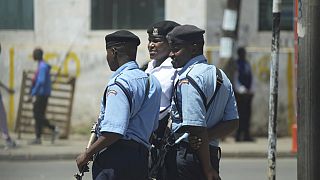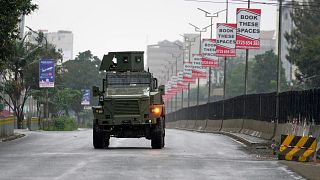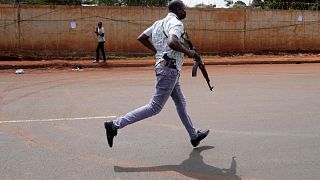Kenya
The Kenyan parliament on Thursday (Nov. 16) approved the deployment of a thousand police officers to Haiti, plunged into chaos and gang violence, as part of a UN-backed mission, despite widespread criticism.
"The ayes have it," laconically declared parliamentary vice-president Gladys Boos Shollei after asking the elected representatives to vote aloud.
The heated debate saw opposition legislators rejecting government plans for Kenya to lead a multinational policing team in Haiti, saying it violated the country’s constitution. Supporters of the motion said Kenya had a moral obligation and duty to aid Haiti.
The Caribbean state is plagued by gang violence, which controls 80% of the capital, with the number of serious crimes reaching record levels, according to the UN representative in the country.
The key issues in the debate were who would fund the deployment and what justifications there are for sending security forces to Haiti, thousands of miles from Kenya.
“Where is the sense in taking 1,000 police officers to Haiti when Kenyans are dying, in need of protection, in need of service from their police officers,” argued opposition lawmaker Rozzah Buya.
Gabriel Tongoya, who chairs parliament’s committee on administration and internal security, said all costs of the deployment would be funded by the United Nations.
Multinational mission
The planned deployment was blocked by the High Court in Nairobi in October. On Thursday (Nov. 16), the court was due to rule on a case by former presidential candidate Ekuru Aukot who said the mission, backed by the United Nations, “was a mistake and a suicide mission."
Human rights NGOs point out that the Kenyan police are accustomed to using force, sometimes lethal, against civilians, which constitutes a major risk in a country where previous foreign interventions have been marked by human rights violations.
Interior minister Kithure Kindiki last week told parliament that Kenya will only deploy the officers to Haiti if funding and equipment was paid for by U.N. member states.
Burundi, Chad, Senegal, Jamaica and Belize have all pledged troops for the multinational mission.
Violence has escalated in Haiti as a heavily-armed gang surrounded a hospital in the capital Port-au-prince Wednesday, trapping patients who included 40 children and newborns. Police later rescued the people.
Gangs across Haiti have continued to grow more powerful since the July 2021 assassination of President Jovenel Moïse, and the number of kidnappings and killings keeps rising.
Over a year ago, Haiti's Prime Minister called for international help over the gang-related insecurity in his country.
15-member UN council approved on Oct. 03 a resolution drafted by the US.
The resolution authorizes the force to deploy for an initial one-year period with a review after nine.
In September, the administration of U.S. President Joe Biden promised to provide logistics and $100 million to support the Kenyan-led force.











Go to video
“I can’t do nuttin’ for ya man”, Nigerian Minister quotes Flavour Flav in rejection of Trump policy
Go to video
U.S. slashes visa duration for some African nationals amid policy shift
Go to video
Nigeria snubbed at White House summit, opposition blames Tinubu
Go to video
Ghana cracks down on gold smuggling with new multi-agency task force
Go to video
African migrants targeted as visa scams surge amid tougher immigration rules in Canada
Go to video
What to know about a potential deal to keep TikTok running in US